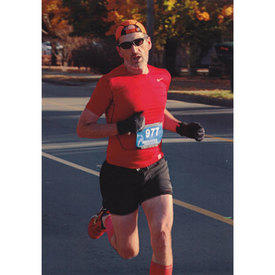What would it take to qualify for Boston?

lporter229
Posts: 4,907 Member
So, ever since I ran my half marathon PR in November at what would be my Boston qualifying pace, I can't get it out of the back of my mind that this pipe dream might actually be achievable. I have only run one full marathon, and I understand that there is a big difference between a full and a half, but it feels like with the right training and dedication it might be doable. I am just looking for opinions and advice from some seasoned marathoners out there on the subject of what it would take to get there. Here is a little background info on me and my running.
I am 42 years old and have been a regular runner for almost 20 years. I have done several half-marathons and 15Ks along the way, but mostly I have just run for my own personal enjoyment, probably averaging 20 miles a week or so unless training for something. I ran my first full marathon with a friend last year with an agreement to run together the whole way. We finished in just under 5 hours. We are currently training for our second marathon together in May, also agreeing to run together with a goal of 4.5 hours, which I have no doubt we can do. I am wondering if I keep my training up, if it would be possible to shoot for a Boston qualifier in the fall. For the record, that time would be a 3:45. My HM PR is 1:52:07 and I did not really push myself too hard. Most of my 10-14 mile training runs are done at a pace o 8:45-9:15...it's just the comfortable pace that I fall into.
Any thoughts or advice on the subject is appreciated!
I am 42 years old and have been a regular runner for almost 20 years. I have done several half-marathons and 15Ks along the way, but mostly I have just run for my own personal enjoyment, probably averaging 20 miles a week or so unless training for something. I ran my first full marathon with a friend last year with an agreement to run together the whole way. We finished in just under 5 hours. We are currently training for our second marathon together in May, also agreeing to run together with a goal of 4.5 hours, which I have no doubt we can do. I am wondering if I keep my training up, if it would be possible to shoot for a Boston qualifier in the fall. For the record, that time would be a 3:45. My HM PR is 1:52:07 and I did not really push myself too hard. Most of my 10-14 mile training runs are done at a pace o 8:45-9:15...it's just the comfortable pace that I fall into.
Any thoughts or advice on the subject is appreciated!
0
Replies
-
We have the exact same half PR time.
 I absolutely think you can do it. I will let the experts chime in on how to get there though and follow along and take their advice myself. 0
I absolutely think you can do it. I will let the experts chime in on how to get there though and follow along and take their advice myself. 0 -
My half PR is about the same.....
I've decided that if I ever want to try to qualify for Boston, I'm not going to mess around - I'm going to get a coach for that.
It's not on my radar right now, though, because at this point I'm more interested in trail ultras, and qualifying for Boston would be a bit of a project.0 -
This content has been removed.
-
It took me 3 marathons to reach my goal of under 4 hours. I almost did not show up to the race because the weather was so horrible, torrential downpours and crazy windy. I was inspired by my neighbor to run it anyway and let go of the goal and just enjoy it. My socks were soaking wet long before the race even started. I am not sure how it happened but I ended up running a 3:50 marathon that day. That is when the thoughts of BQ’ing got into my head because if I could PR in those conditions by 10 + minutes, what could I have done in normal weather. A BQ for me is 3:40 so I created a pretty intense program to get me there. For me it took 60 miles per week, speedwork, hills, and more/longer long runs. I ran my next marathon in 3:37 but it was a horrible experience. It was hot, I was dehydrated and struggled from mile 10 until the end. It was not the race I was hoping for even though I BQ’d. I signed up for another marathon 6 weeks later following the same program. It was rainbows and unicorns, everything I ever wanted, 3:33. Oh yeah it also took me breaking up with MFP and fueling properly a day before and the day of the race. I am hoping to run Boston in 2015, hopefully I get in.0
-
It took me 3 marathons to reach my goal of under 4 hours. I almost did not show up to the race because the weather was so horrible, torrential downpours and crazy windy. I was inspired by my neighbor to run it anyway and let go of the goal and just enjoy it. My socks were soaking wet long before the race even started. I am not sure how it happened but I ended up running a 3:50 marathon that day. That is when the thoughts of BQ’ing got into my head because if I could PR in those conditions by 10 + minutes, what could I have done in normal weather. A BQ for me is 3:40 so I created a pretty intense program to get me there. For me it took 60 miles per week, speedwork, hills, and more/longer long runs. I ran my next marathon in 3:37 but it was a horrible experience. It was hot, I was dehydrated and struggled from mile 10 until the end. It was not the race I was hoping for even though I BQ’d. I signed up for another marathon 6 weeks later following the same program. It was rainbows and unicorns, everything I ever wanted, 3:33. Oh yeah it also took me breaking up with MFP and fueling properly a day before and the day of the race. I am hoping to run Boston in 2015, hopefully I get in.
Congrats on the BQ! Quite an accomplishment. I do lts of hills and speedwork already, but 60 miles a week is a far cry from where I am at. i am not sure I have the time or capability of running that much. Pretty much rethinking this whole thing. Maybe I will just stick to half marathons!0 -
That is just what I did. Looking back that might have been a little overkill.0
-
with your last marathon being just under 5 hours i would focus on the 4:30 goal first and work your way down. I'm not saying a BQ is impossible but i think its a big goal for to BQ for your second marathon. Some day i would like to but i have too much on my plate to be able to train how i would need to even come close.0
-
Marathon pace is going to be about 20 to 30 seconds slower than your HM pace. Using that logic, you shouldn't even consider the possibility of running a BQ until your HM pace is about 30 seconds faster than what your BQ MP would be.
With that being said, it takes a long time to develop the fitness required to bring your marathon time in line with the other times listed in a calculator like McMillan's. I usually tell first time marathoners that you need to add about 20 minutes to the predicted marathon finish time and that's usually spot on if they have a successful training cycle.
So, what would it take? Probably a couple years of high mileage. I'd think you would need to average 45 MPW for a couple years and then do a marathon training cycle that takes your weekly mileage into the high 60, low 70 MPW range. I personally do not know anyone who has ran a BQ on a training plan that maxes out at fewer than 60 miles per week. They may exist, but I don't know any.0 -
I agree with Carson. It is more likely that you will take a few years to get to BQ pace in a marathon. That being said, you never know, right? So just keep working on your pace, with hill repeats, intervals, fartleks and of course keeping your mileage up with weekly long runs and I think that you will see your pace improve with each marathon. I ran 7 marathons, with my time getting better with each one, until the last one where I had severe knee pain (probably IT band issues due to poor running shoes) in the last 7 miles. It was awful. If it wasn't for training for my black belt this year, I would have signed up for another marathon hoping to get closer or qualify for Boston this year. But I can't do both. So maybe I'll give it another go next year!
You can do it!! It might take more time than you were hoping but if it's a dream of yours, don't let that dream go!! Good luck!!0 -
Marathon pace is going to be about 20 to 30 seconds slower than your HM pace. Using that logic, you shouldn't even consider the possibility of running a BQ until your HM pace is about 30 seconds faster than what your BQ MP would be.
With that being said, it takes a long time to develop the fitness required to bring your marathon time in line with the other times listed in a calculator like McMillan's. I usually tell first time marathoners that you need to add about 20 minutes to the predicted marathon finish time and that's usually spot on if they have a successful training cycle.
So, what would it take? Probably a couple years of high mileage. I'd think you would need to average 45 MPW for a couple years and then do a marathon training cycle that takes your weekly mileage into the high 60, low 70 MPW range. I personally do not know anyone who has ran a BQ on a training plan that maxes out at fewer than 60 miles per week. They may exist, but I don't know any.
I agree with the training suggestions. I do know quite a few people who have BQed with much less than 60 MPW, but they were doing lots of cross training. It took me about two and a half years to get from 25 MPW to BQ. I ran three marathons in the final year, qualifying on my third attempt. I pretty much stayed in the 50-70 MPW range that whole year.
That said, there is a lot of luck involved. I consider myself to be in much better shape now, 2.5 years after I BQed. I've run 7 marathons since then and haven't requalified (although only 3 of those could be considered legitimate BQ courses).0
This discussion has been closed.







